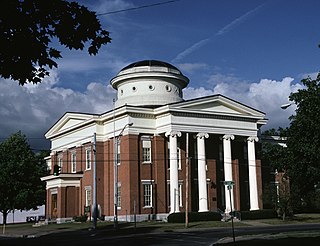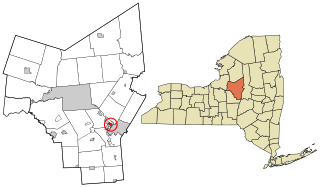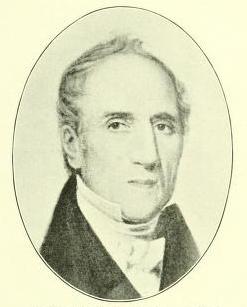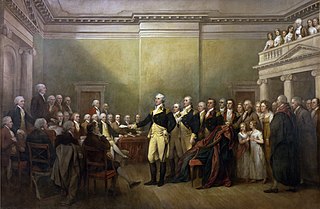
Oneida County is a county in the state of New York, United States. As of the 2020 census, the population was 232,125. The county seat is Utica. The name is in honor of the Oneida, one of the Five Nations of the Iroquois League or Haudenosaunee, which had long occupied this territory at the time of European encounter and colonization. The federally recognized Oneida Indian Nation has had a reservation in the region since the late 18th century, after the American Revolutionary War.

Utica is a city in the Mohawk Valley and the county seat of Oneida County, New York, United States. The tenth-most-populous city in New York State, its population was 65,283 in the 2020 U.S. Census. Located on the Mohawk River at the foot of the Adirondack Mountains, it is approximately 95 mi (153 km) west-northwest of Albany, 55 mi (89 km) east of Syracuse and 240 mi (386 km) northwest of New York City. Utica and the nearby city of Rome anchor the Utica–Rome Metropolitan Statistical Area comprising all of Oneida and Herkimer Counties.

New York Mills is a village in Oneida County, New York, United States. The population was 3,327 at the 2010 census.

Yorkville is a village in Oneida County, New York, United States. The population was 2,689 at the 2010 census.
Dolgeville is a village in Herkimer and Fulton counties, New York, United States. The population was 2,206 at the 2010 census. The village is named after the industrialist Alfred Dolge.

Howard Johnson's, or Howard Johnson by Wyndham, is an American hotel chain with locations worldwide, as well as a former restaurant chain. The chain began as a restaurant founded by Howard Deering Johnson in 1925; in the 1950s, the company expanded operations by opening hotels, then known as Howard Johnson's Motor Lodges, which were often located next to restaurants. Throughout the 1960s and 1970s, it was the largest restaurant chain in the U.S., with more than 1,000 combined company-owned and franchised outlets.

The Adirondack Bank Center at the Utica Memorial Auditorium is a 3,860-seat multi-purpose arena in Utica, New York, with a capacity of 5,700 for concerts. Nicknamed the Aud, it is the home arena of the Utica Comets, the AHL affiliate of the NHL's New Jersey Devils, and Utica City FC of the MASL.

Alexander Bryan Johnson, was a British-born American philosopher and semanticist. He immigrated to the United States as a child and worked as a banker in Utica, New York. He wrote about economics, language, and the nature of knowledge.
John C. Devereux was a pioneering Irish Catholic in Utica, New York and its first mayor. "A settler of 1802 and a very prince among his fellows was John C. Devereux whose honourable career and many deeds of charity left behind him a memory as verdant as that of the green isle whence he came."

Nathan Williams was a United States representative from New York and the first lawyer to permanently establish a law practice in Utica. During the War of 1812 Williams volunteered for service and became a major in a company of militia at Sackett's Harbor.

Alfred Conkling Coxe Sr. was a United States circuit judge of the United States Court of Appeals for the Second Circuit and of the United States Circuit Courts for the Second Circuit and previously was a United States district judge of the United States District Court for the Northern District of New York.

Benjamin Walker was a soldier in the American Revolutionary War and later served as a U.S. Representative from New York.
The New York State League was a minor league baseball league that played between 1885 and 1917. The league began play as an Independent level league before playing from 1902 to 1917 as a Class B level league. League franchises were based in New York and Pennsylvania. John H. Farrell served as president of the league from 1897 to 1917.

Joseph Bennett Plummer was a career United States Army officer, and rose to the rank of brigadier general of volunteers during the American Civil War.

Sinclair House was a 19th-century hotel which stood at 754 Broadway and Eighth Street in Manhattan, New York City. It was demolished in 1908.
The Seneca Road Company was formed to improve the main road running west from Utica, New York, the Genesee Road, from Utica to Canandaigua and operate it as a toll road or turnpike. The road was originally laid out in 1794 from Baggs Square in downtown Utica at the ford of the Mohawk River and followed the Indian trail past Syracuse to Canandaigua. Some accounts say it went to Geneva and Avon originally. There was no City of Syracuse then. The road became known as the Seneca Turnpike, which was 157 miles (253 km) long and, at the time, the longest toll road in the state.

Historic Hotels of America is a program of the National Trust for Historic Preservation that was founded in 1989 with 32 charter members; the program accepts nominations and identifies hotels in the United States that have maintained their authenticity, sense of place, and architectural integrity.

Temple Clark was an American attorney, Democratic politician, Union Army officer, and Wisconsin pioneer. He served two years in the Wisconsin Senate, representing Manitowoc and Calumet counties, and served as an adjutant on the staff of General William Rosecrans during the American Civil War.

Mohawk Valley Psychiatric Center is a state-run psychiatric hospital located in Utica, New York.

William Williams was an American printer, publisher and bookseller, originally from Massachusetts. He moved to New Hartford, New York, with his family and soon established himself in the printing and newspaper business in nearby Utica, New York during the early nineteenth century. Williams printed the first directory for Utica and published several Utica newspapers and almanacs. Through his various newspapers he published editorials in support of prominent politicians, canal and railroad proposals, and advocated for the colonization of free Blacks. During the War of 1812, he volunteered for military service, organized a company of militia of young men from Utica, and was present during the Second Battle of Sacket's Harbor, where he advanced to the rank of colonel. When a cholera epidemic broke out in Utica in 1832, Williams volunteered in setting up temporary hospitals and aiding the sick and himself became infected. He was an elder and a devoted member of Utica's First Presbyterian Church, and was strongly opposed to Freemasonry, to which he published a controversial newspaper, The Elucidator. Always civic minded, Williams spent the better part of his adult life involved in several areas of public service. In his latter business years he suffered financial difficulties, forcing him to sell off his bookstore and many of his effects. After receiving a serious head injury in a stagecoach accident he endured the last years of his life with a measure of mental impairment.


















